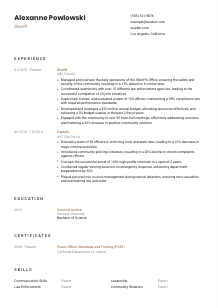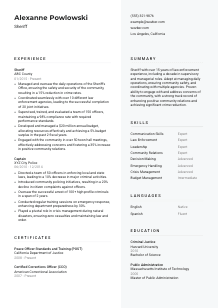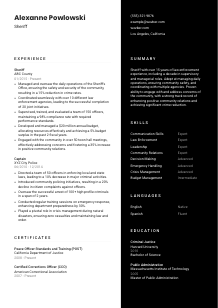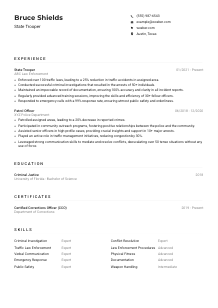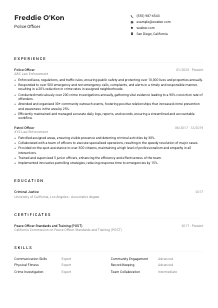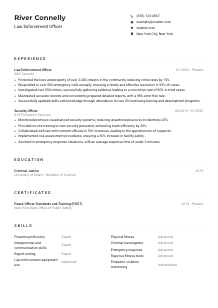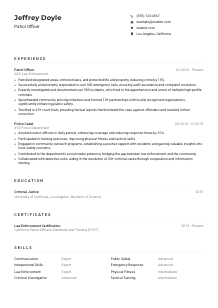Sheriff Resume Example
Upholding the law, but your resume feels like an outlaw? Wrangle it into shape with this Sheriff resume example, crafted using Wozber free resume builder. Discover how you can sheriff-ly tailor your law enforcement experience to match job expectations, and ride straight into your career's sunset, badge shining bright!
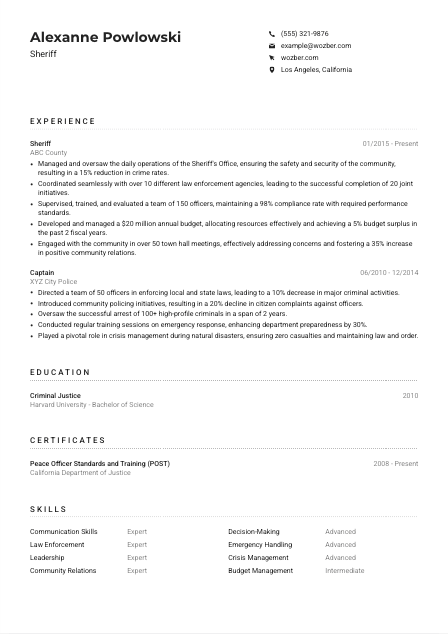
How to write a Sheriff Resume?
Greetings, aspiring Sheriff! In the realm of law enforcement, your resume is not just a document – it's your badge of honor, showcasing your service, leadership, and community commitment. As you set sights on this noble position, it's vital to craft a resume that resonates with the essence of the role.
Armed with the power of Wozber's free resume builder, tailored for ATS optimization, you're one step closer to serving and protecting with pride. Follow along as we guide you through tailoring your resume, ensuring it's a shining testament to your dedication and readiness for the Sheriff's badge.
Personal Details
The Personal Section is your opening statement. Let's make it speak volumes about your commitment and readiness for the demanding role of a Sheriff.
1. Brand Yourself with Confidence
Your name is the foundation of your professional identity. Make sure it stands out with a clear, bold font. Remember, you're not just a candidate; you're the next potential leader of law enforcement in your community.
2. Identify with Your Target Role
Directly below your name, align yourself with the position by stating "Sheriff." This not only shows your ambition but also tailors your resume to the specific role, making it easier for the ATS and hiring managers to spot a perfect fit.
3. Essential Contact Details
Ensure your phone number and a professional email address (preferably in the firstname.lastname@[emailprovider].com format) are included, making it easy for potential employers to reach out. Accuracy is key; a misplaced digit or a typo can mean a missed opportunity.
4. Demonstrate Your Local Knowledge
In law enforcement, understanding local nuances is crucial. Mentioning "Los Angeles, California" as your location not only aligns with the job's geographic requirements but also implicitly shows your familiarity and experience with the local community and issues.
5. Online Presence: A Digital Footprint
If relevant, add your LinkedIn profile or a professional website. This is your chance to show a well-rounded image, including recommendations, additional achievements, and a network that vouches for your character and professionalism.
Takeaway
The Personal Details section is your chance to make a strong first impression. Craft it with care, ensuring every piece of information promotes your candidacy for the Sheriff role. This is where your journey begins; make it count.





Experience
Your experience is the backbone of your resume. Here, more than anywhere, is where you demonstrate you're cut out for the Sheriff role. Let's delve into showcasing your experience with precision and passion.
- Managed and oversaw the daily operations of the Sheriff's Office, ensuring the safety and security of the community, resulting in a 15% reduction in crime rates.
- Coordinated seamlessly with over 10 different law enforcement agencies, leading to the successful completion of 20 joint initiatives.
- Supervised, trained, and evaluated a team of 150 officers, maintaining a 98% compliance rate with required performance standards.
- Developed and managed a $20 million annual budget, allocating resources effectively and achieving a 5% budget surplus in the past 2 fiscal years.
- Engaged with the community in over 50 town hall meetings, effectively addressing concerns and fostering a 35% increase in positive community relations.
- Directed a team of 50 officers in enforcing local and state laws, leading to a 10% decrease in major criminal activities.
- Introduced community policing initiatives, resulting in a 20% decline in citizen complaints against officers.
- Oversaw the successful arrest of 100+ high‑profile criminals in a span of 2 years.
- Conducted regular training sessions on emergency response, enhancing department preparedness by 30%.
- Played a pivotal role in crisis management during natural disasters, ensuring zero casualties and maintaining law and order.
1. Highlighting Relevant Job Requirements
Starting with a deep understanding of the job description is crucial. For a Sheriff, managing the daily operations and coordinating with agencies are among the top responsibilities. Pinpoint these in your resume, showing you're already adept at these tasks.
2. Crafting a Narrative of Progress
Organize your experience chronologically, emphasizing leadership roles and impactful achievements. The goal is to narrate your ascent up the ranks, showcasing the depth of your experience and your growing responsibilities over time.
3. Illustrate Your Impact
For each role, describe how you made a difference. Use accomplishment statements like "Managed and oversaw daily operations, achieving a 15% reduction in crime rates." Quantifying your successes makes them more tangible and memorable.
4. Tailor for the ATS
Incorporate keywords from the job description throughout your experience section. This ATS optimization strategy ensures your resume scores high on relevance, pushing your application to the top of the pile.
5. Prioritize Relevance Over Duration
While your long career might have many highlights, focus on the experiences that best match the Sheriff role. Quality over quantity communicates your suitability more effectively to the hiring team.
Takeaway
Your experience section is where you prove, beyond a doubt, that you're ready for the Sheriff's badge. It's about more than just what you've done; it's a story of how you've led, improved, and protected communities throughout your career. Craft it with the diligence it deserves.
Education
In law enforcement, your educational background forms the legal and ethical foundation of your career. Let's ensure this section highlights your commitment to continuous learning and adherence to justice.
1. Meeting the Requirements
"Bachelor's degree in Criminal Justice, Public Administration, or related field is preferred." If this matches your education, make it a highlight. This not only meets the base requirement but also suggests a deep understanding of the legal framework and administrative acumen.
2. Structure for Clarity
Lay out your educational background in an easy-to-scan format: degree, field, institution, and graduation date. This clarity respects the hiring manager's time and makes your qualifications immediately apparent.
3. Tailoring Your Degree
Aligning your degrees with the specified preferences in the job description demonstrates your specialized knowledge. For example, listing a "Bachelor of Science in Criminal Justice" directly ties your academic background to the practical needs of the Sheriff role.
4. Expanding Beyond the Basics
While primary degrees are crucial, also mention any additional law enforcement certifications, training, or coursework. This shows a commitment to exceeding the minimum requirements and continuously updating your knowledge and skills.
5. Honors and Extracurriculars
If you have academic honors, involvement in relevant clubs, or leadership positions that demonstrate your leadership and engagement with law enforcement issues, include them. They add depth to your profile, showing your dedication beyond the classroom.
Takeaway
Your education section is more than a list of schools and degrees; it's proof of your commitment to upholding the law and serving with integrity. It bolster[s] your qualifications, providing a solid foundation for your candidacy as Sheriff.
Certificates
In the law enforcement world, certifications are your badges of education and training. They showcase your commitment to maintaining high standards of law enforcement excellence. Let's pin these badges proudly on your resume.
1. Zero in on the Essentials
For the Sheriff role, "Possession of or ability to obtain a valid Peace Officer Standards and Training (POST) certification" is crucial. Highlighting this certification places you in the running, showing you meet one of the fundamental criteria.
2. Quality Over Quantity
Focus on the certifications that have direct relevance to the Sheriff role. This approach ensures that the hiring manager's attention is drawn to your most pertinent qualifications, rather than being obscured by less relevant accolades.
3. Timeliness Matters
Indicating the dates of your certifications, especially those with validity periods, speaks to your diligence in maintaining them. For ongoing certifications, stating "2008 - Present" demonstrates your long-term commitment and continuous qualification.
4. Continuous Learning
Law enforcement is an ever-evolving field. Showcasing recent certifications or those in progress illustrates your dedication to staying abreast of the latest legal and procedural developments, portraying you as a proactive and forward-thinking candidate.
Takeaway
Your certifications are a clear indication of your professional development and readiness for the responsibilities of a Sheriff. Flaunt them prominently, letting each one underline your competence and dedication to law enforcement.
Skills
The skills section of your resume is where you get to show off the tools of your trade. In the context of applying for a Sheriff position, it's about highlighting the skills that make you an effective leader, communicator, and law enforcer.
1. Decode and Match
Starting with the job description, identify both the explicitly mentioned and the implicitly required skills. For a Sheriff, skills like "leadership," "decision-making," and "communication" are typically non-negotiable. Aligning your listed skills with these requirements speaks directly to your fit for the role.
2. Prioritize and Organize
List both hard and soft skills, ensuring there's a balance. While technical prowess in law enforcement is critical, never underestimate the power of soft skills, especially in leadership and community engagement roles.
3. Clarity is Key
Your skills section should be a crisp, clean list that's easy to scan. Remember, this isn't about padding; it's about presenting a concise picture of what you bring to the table. Focus on the skills that position you as the ideal Sheriff for the job at hand.
Takeaway
This section is your opportunity to shine, to show the hiring committee at a glance that you possess the skills necessary to lead, protect, and serve. Make every skill count, and align them with the needs of the community you aspire to safeguard.
Languages
The ability to communicate effectively in multiple languages can be a significant asset in law enforcement, particularly in diverse communities. Let's articulate your linguistic prowess and how it can bolster your role as a Sheriff.
1. Relevance to the Role
Given the specified need for "English fluency," it's paramount to list your proficiency in English at the top. In a cosmopolitan area like Los Angeles, additional languages can also present a considerable advantage, demonstrating your ability to connect with various community segments.
2. Detail Your Linguistic Arsenal
After English, list other languages you are proficient in. For instance, being fluent in Spanish in a city with a significant Hispanic population can be invaluable. Detail your proficiency level honestly and clearly for each.
3. Honesty in Proficiency
Use clear terms like "Native," "Fluent," "Intermediate," and "Basic" to describe your language skills. This transparency helps set realistic expectations and demonstrates your integrity.
4. The Importance of Language in Law Enforcement
Understanding and being understood is crucial in law enforcement. Listing multiple languages, even at a basic level, shows your willingness to bridge communication gaps and build trust within diverse communities.
5. Reflecting on the Role's Scope
For a Sheriff, the ability to communicate effectively with a diverse populace is not just a skill; it's a necessity. Your language skills can significantly contribute to better community relations and more effective law enforcement.
Takeaway
Your linguistic skills are a testament to your ability to engage with and understand the community you serve. Highlight them as part of your commitment to inclusive, compassionate law enforcement. Let your resume speak volumes in every language you know.
Summary
A compelling summary section can distinguish you from the crowd right from the start. It's your manifesto, declaring your readiness and enthusiasm for taking on the role of Sheriff. Let's craft it with the gravitas it deserves.
1. Capture the Essence
Begin with a strong introduction that encapsulates your career and aspirations. For instance, "Sheriff with over 15 years of law enforcement experience, including a decade in supervisory and managerial roles," immediately sets the stage for your candidacy.
2. Tackle Key Requirements
Directly address the main points from the job description, showcasing your qualifications. Phrases like "Adept at managing daily operations and ensuring community safety" align your experience with the employer's needs.
3. Keep It Succinct
Your summary should be a teaser, offering just enough to pique interest and encourage deeper reading. Three to five lines are enough to convey your competency and zeal for the Sheriff role.
4. Speak to Your Uniqueness
Highlight what sets you apart, whether it's a significant reduction in crime rates under your leadership or exceptional community outreach efforts. This is your chance to shine.
Takeaway
The summary is your handshake from a distance, your introduction to the hiring committee, and your first opportunity to impress. Make it concise, compelling, and reflective of your suitability and enthusiasm for the Sheriff position. It's the spark that ignites interest in your application.
Launching Your Sheriff Journey
With these insights and Wozber's free resume builder at your side, you're now ready to craft a resume that not only meets the requirements but exceeds expectations. Remember, your resume is more than a record of your career; it's a testament to your readiness to serve, protect, and lead. Use Wozber to ensure your resume is ATS-compliant, employing an ATS-friendly resume template and ATS optimization techniques, including an ATS resume scanner to ensure keyword relevance.
Now, go forth, tailor your resume, and step confidently into your next chapter of law enforcement leadership. The badge awaits.

- A minimum of 10 years of experience in law enforcement, with at least 5 years of supervisory or managerial experience.
- Bachelor's degree in Criminal Justice, Public Administration, or related field is preferred.
- Possession of or ability to obtain a valid Peace Officer Standards and Training (POST) certification within the state.
- Strong leadership, decision-making, and communication skills, with the ability to handle emergencies and stressful situations effectively.
- Thorough knowledge of federal, state, and local laws and regulations, as well as an understanding of community-oriented policing.
- English fluency is a significant criterion for this role.
- Must be located in Los Angeles, California.
- Manage and oversee the daily operations of the Sheriff's Office, ensuring the safety and security of the community.
- Coordinate with other law enforcement agencies, state entities, and local community organizations on various projects and initiatives.
- Supervise, train, and evaluate staff, ensuring they meet the required standards of performance and professionalism.
- Develop and manage the department's annual budget and financial resources.
- Engage with the community to address concerns, establish positive relationships, and foster cooperation in law enforcement efforts.





